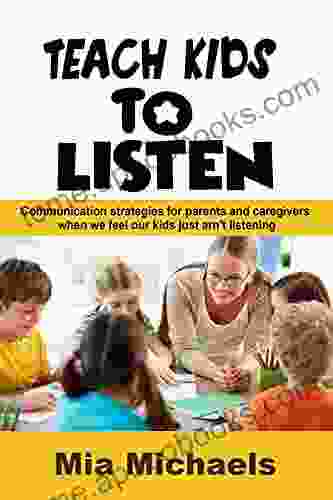Communication Strategies For Parents And Caregivers When We Feel Our Kids Just.

As parents and caregivers, we often find ourselves in situations where our kids just don't seem to understand what we're saying. It can be frustrating and disheartening, leaving us feeling like we're talking to a wall. But there are effective communication strategies that can help us break down these barriers and build stronger, more meaningful relationships with our children.
Active Listening: The Key to Understanding
Active listening is not just about hearing what your child is saying, but truly understanding their perspective. It involves paying full attention to both their words and their body language, and reflecting back what you've heard to ensure that you've understood correctly.
4 out of 5
| Language | : | English |
| File size | : | 901 KB |
| Text-to-Speech | : | Enabled |
| Screen Reader | : | Supported |
| Enhanced typesetting | : | Enabled |
| Word Wise | : | Enabled |
| Print length | : | 15 pages |
| Lending | : | Enabled |
To practice active listening, try these tips:
- Make eye contact and show that you're engaged.
- Avoid interrupting or changing the subject.
- Ask clarifying questions to demonstrate your understanding.
- Summarize what your child has said to check for accuracy.
- Validate their feelings, even if you don't agree with them.
By actively listening to your child, you're showing them that you value their thoughts and feelings. This can help build trust and create a safe space for open communication.
Empathy: Stepping into Their Shoes
Empathy is the ability to put yourself in someone else's shoes and see things from their perspective. This is crucial for effective communication with children, as it allows you to understand their thoughts, feelings, and motivations.
To develop empathy, try to:
- Imagine yourself in your child's situation.
- Try to understand their developmental stage and perspective.
- Consider their past experiences and how they might be influencing their behavior.
- Avoid judgment and criticism, even if you don't agree with their actions.
By showing empathy, you're demonstrating to your child that you understand their world and that you're there for them. This can foster a closer bond and make them more willing to listen to your point of view.
Respectful Communication: Building a Foundation of Trust
Respectful communication is essential for building a healthy and productive relationship with your child. It involves treating them with dignity and consideration, even when you disagree with them.
To communicate respectfully, try to:
- Use a respectful tone of voice, even if you're feeling angry or frustrated.
- Avoid name-calling, insults, or threats.
- Listen to your child's perspective without interrupting or dismissing their feelings.
- Apologize when you make a mistake or say something hurtful.
By communicating respectfully, you're showing your child that you value them as a person. This can help build trust and create a safe space for open dialogue.
Positive Communication: Encouraging and Uplifting
Positive communication focuses on the good things your child is ng and encourages them to continue growing and developing. It involves using praise, encouragement, and support to help them reach their full potential.
To communicate positively, try to:
- Catch your child being good and praise them for their behavior.
- Encourage them to try new things and take risks.
- Celebrate their successes, both big and small.
- Avoid using negative language or criticism.
By communicating positively, you're helping your child build self-esteem and confidence. This can motivate them to continue making good choices and striving for success.
Additional Tips for Effective Communication
In addition to the strategies mentioned above, here are some other tips for effective communication with children:
- Choose the right time and place to talk.
- Be patient and allow your child time to process their thoughts and feelings.
- Avoid using jargon or technical terms that your child may not understand.
- Be open to feedback and make adjustments as needed.
- Seek professional help if you're struggling to communicate effectively with your child.
Remember, effective communication with children is a journey, not a destination. It takes time, effort, and practice. But by implementing these strategies, you can build stronger, more meaningful relationships with your kids and help them reach their full potential.
Communication is a vital part of any relationship, and it's especially important in the parent-child relationship. By using effective communication strategies, you can bridge the gap between you and your child, build trust, and create a strong foundation for a lifetime of meaningful connections.
So next time you're feeling like your kids just don't understand what you're saying, take a step back and try one of these strategies. You may be surprised at how much of a difference it makes.
4 out of 5
| Language | : | English |
| File size | : | 901 KB |
| Text-to-Speech | : | Enabled |
| Screen Reader | : | Supported |
| Enhanced typesetting | : | Enabled |
| Word Wise | : | Enabled |
| Print length | : | 15 pages |
| Lending | : | Enabled |
Do you want to contribute by writing guest posts on this blog?
Please contact us and send us a resume of previous articles that you have written.
 Book
Book Novel
Novel Page
Page Chapter
Chapter Text
Text Story
Story Genre
Genre Reader
Reader Library
Library Paperback
Paperback E-book
E-book Magazine
Magazine Newspaper
Newspaper Paragraph
Paragraph Sentence
Sentence Bookmark
Bookmark Shelf
Shelf Glossary
Glossary Bibliography
Bibliography Foreword
Foreword Preface
Preface Synopsis
Synopsis Annotation
Annotation Footnote
Footnote Manuscript
Manuscript Scroll
Scroll Codex
Codex Tome
Tome Bestseller
Bestseller Classics
Classics Library card
Library card Narrative
Narrative Biography
Biography Autobiography
Autobiography Memoir
Memoir Reference
Reference Encyclopedia
Encyclopedia Stephen J Golds
Stephen J Golds Ashley Hutson
Ashley Hutson Atlas Rose
Atlas Rose Kyu Eun Lee
Kyu Eun Lee Tomasz Jedrowski
Tomasz Jedrowski Atarah Ben Tovim
Atarah Ben Tovim Annie Watts
Annie Watts Austin Jersild
Austin Jersild Kaelah Hennessee
Kaelah Hennessee Jan Zwicky
Jan Zwicky Ashlea Ryan
Ashlea Ryan Ashley Lord
Ashley Lord Joshua Gamson
Joshua Gamson Victor Hugo
Victor Hugo Pte90 Academy
Pte90 Academy Dixon James
Dixon James Archer Mayor
Archer Mayor Jeff Crippen
Jeff Crippen Anton E Lawson
Anton E Lawson Hang Thi Yen Black
Hang Thi Yen Black
Light bulbAdvertise smarter! Our strategic ad space ensures maximum exposure. Reserve your spot today!

 Thomas PowellUnlock the Secrets of Profitable Stock Trading with "The Blue Print Stock...
Thomas PowellUnlock the Secrets of Profitable Stock Trading with "The Blue Print Stock...
 Gabriel BlairEmpowering History Scholars: Advanced Writing and Historical Thinking Skills...
Gabriel BlairEmpowering History Scholars: Advanced Writing and Historical Thinking Skills... Reed MitchellFollow ·5.1k
Reed MitchellFollow ·5.1k Peter CarterFollow ·2.1k
Peter CarterFollow ·2.1k Bob CooperFollow ·9.7k
Bob CooperFollow ·9.7k Vic ParkerFollow ·11.8k
Vic ParkerFollow ·11.8k Jacques BellFollow ·10.4k
Jacques BellFollow ·10.4k Jared NelsonFollow ·15.2k
Jared NelsonFollow ·15.2k Edgar Allan PoeFollow ·3.8k
Edgar Allan PoeFollow ·3.8k John UpdikeFollow ·6.5k
John UpdikeFollow ·6.5k

 Gabriel Garcia Marquez
Gabriel Garcia MarquezLad Dog Baby Professor: The Perfect Book for Your Child
Lad Dog Baby...

 Fredrick Cox
Fredrick CoxAn Excerpt With Fifty Ways To Help Animals Promo Books:...
: Embracing Animal...

 Kelly Blair
Kelly Blair5th Grade US History: Famous US Authors: Fifth Grade...
Step into a captivating world of historical...

 Natsume Sōseki
Natsume SōsekiKull the Destroyer: A Timeless Tale of Sword and Sorcery
The Creation of a...

 Jim Cox
Jim CoxDas Ist Supertoll: Unlocking the Magic of German for Kids
Immersive Learning with...

 Bruce Snyder
Bruce SnyderUnlock the World of Quilting for Kids: Discover "Quick...
Are you ready to embark on a delightful...
4 out of 5
| Language | : | English |
| File size | : | 901 KB |
| Text-to-Speech | : | Enabled |
| Screen Reader | : | Supported |
| Enhanced typesetting | : | Enabled |
| Word Wise | : | Enabled |
| Print length | : | 15 pages |
| Lending | : | Enabled |








